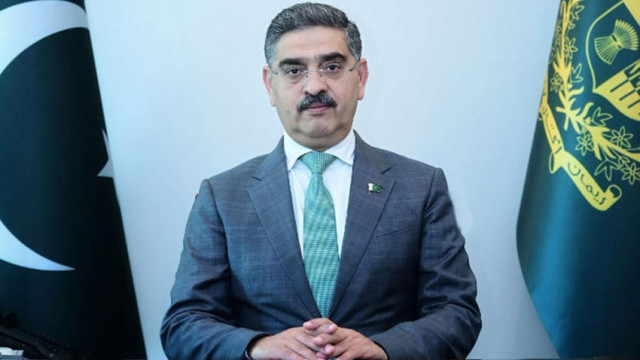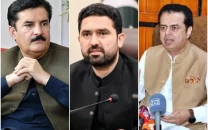Govt mulls ordinance to digitise economy
IT ministry to be given lead role in effort to broaden tax base

In an effort to digitise the economy, the interim government is planning to bring legislative and administrative changes, besides empowering the Ministry of Information Technology to play the role of a data-gathering agency to broaden a narrow tax base of 4.2 million filers.
Sources told The Express Tribune that various proposals to increase the number of income tax return filers were discussed during the week – first with Caretaker Prime Minister Anwaarul Haq Kakar, and then in the Special Investment Facilitation Council (SIFC).
During a briefing to the prime minister, the Federal Board of Revenue (FBR) suggested a way forward.
Read Kakar sees SIFC as engine of prosperity
Separately, the Ministry of Information Technology on Saturday presented proposals to the SIFC with regard to having a central role in the data depository exercise to broaden the tax base.
Approving the proposals, the SIFC decided that the Ministry of Information Technology would take a lead role in the data collection exercise from the four provinces for the purpose of broadening the tax base, according to the participants of the meeting.
The data about various transactions carried out by non-filers will be received from the provinces and federal departments by the ministry and will be shared with the FBR for registration of new taxpayers, according to the plan.
Minister for Information Technology Umar Saif said that work on two major issues for the purpose of digitisation of the economy and taxation system were pending.
The minister said that his ministry will help bring more people into the tax net as well as get due taxes from those who have already been paying the taxes.
The size of the informal and formal economy is almost the same, Saif said, adding that some work has already been done towards digitisng the economy, yet people are unable to shop through digital means.
There are 7.6 million registered persons and companies with the FBR but only 4.2 million of them filed their returns in the last fiscal year, according to an interim report by the Revenue and Reform Mobilisation Commission (RRMC).
The sources said that promulgating an ordinance with the aim to digitise the economy was being discussed. The ordinance would make it legally binding upon the provinces and other relevant agencies to share the data with the Ministry of Information Technology.
A presidential ordinance is the only legislative avenue available to the caretaker.
However, an ordinance has a lifespan of only four months which, according to some government officials, would provide an ad-hoc base to the steps being taken by the Ministry of Information Technology.
Two task forces are also being set up for the purpose.
Also read SIFC meets with traders to discuss investment opportunities
The IT ministry will have a key role in both the task forces – a move that marks a departure from its traditional role.
The FBR’s performance also came under the microscope during the SIFC meeting but the solutions that are being evolved may not address the core issue. The army chief has asked the interim finance minister to restructure the FBR without the involvement of its two key services – Inland Revenue and the Customs Group.
The data availability has never been an issue, as the FBR has been getting the information from the provinces, excise departments, commercial banks and the National Database and Registration Authority (NADRA). The main challenge is to translate it into actionable and taxable information.
The sources said that the FBR has proposed to the prime minister to set up a new authority or wing for the purpose of registration of new taxpayers. The FBR added that the oversight role of the authority can be given to any other ministry, as it does not have the human resource for the purpose. In case the job still rests with the FBR, the management has proposed to hire more people on the FBR’s strength.
The sources said that some of the participants were not impressed with almost 30% increase in the tax collection, terming it the result of high inflation. Without out-of-the-box measures, they saw a shortfall in the FBR’s collection against the Rs9.415 trillion target due to a dip in the collection of withholding tax and duties at the import stage.
During first two months of the current fiscal year, the FBR pooled Rs1.208 trillion in taxes, roughly Rs25 billion more than the assigned target.
There was a view in the SIFC meeting that the domestic tax collection has to be over 50% to achieve the year-end tax target, as there would be a dip in taxes at the import stage.
The issues like exclusion of agriculture income from the federal government’s domain and undue protection to traders, exporters and wholesale dealers have kept the FBR’s tax-to-GDP ratio to a dismal level of 8.6%.
The FBR’s heavy reliance on withholding taxes also made it a lazy organisation and as a result, the authorities concerned are now considering involving a third ministry to perform the functions that are considered to be the core domain of the Ministry of Finance and Revenue.
New visa regime
Meanwhile, caretaker Premier Kakar announced a new easy visa regime for foreign businessmen desiring to visit Pakistan.
In a statement after the fifth meeting of the Apex Committee of the SIFC, he said that important decisions were made in the meeting.
According to one of the decisions, he said those foreign businessmen who want to visit Pakistan will get easy visas on the basis of a document from their country or from international business organisations.
Pakistani missions would issue visas to foreign businessmen on the basis of that single document, he said, adding that the new visa regime would make Pakistan a country open for business.
The prime minister said besides, if Pakistan’s chambers of business or business organisations issue a document to a foreign businessman, easy visas would also be issued to them.
“People who work in mid-sized and large businesses can also avail this visa facility,” he added.
He expressed the hope that under this new visa regime, Pakistan would enter a new phase of business and economy.



















COMMENTS
Comments are moderated and generally will be posted if they are on-topic and not abusive.
For more information, please see our Comments FAQ